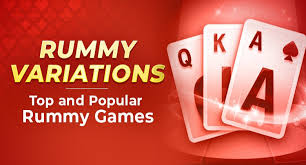Rummy Variations, is a timeless card game known for its blend of strategy, skill, and chance. Since its origins, Rummy has inspired a multitude of variations, each offering a unique twist on the classic gameplay. These variations not only expand the game’s appeal but also introduce new rules, strategies, and challenges. In this article, we’ll explore several popular Rummy variations, detailing their rules, gameplay, and distinctive features. Whether you’re a seasoned Rummy player or new to the game, these variations offer exciting ways to enjoy this classic card game.
1. Gin Rummy
Overview: Gin Rummy is a popular two-player variant that emphasizes quick gameplay and strategic decision-making. Developed in the early 20th century, it has become a staple in card game collections.
Rules:
- Players are dealt 10 cards each from a standard 52-card deck.
- The goal is to form melds (sets and runs) and reduce the total value of unmelded cards.
- Players draw and discard cards to achieve this goal, aiming to declare “Gin” by forming all their cards into melds.
Distinctive Features:
- Simple, fast-paced play suited for two players.
- Emphasis on minimizing the value of unmelded cards.
2. Indian Rummy
Overview: Indian Rummy is a widely played variation in South Asia that utilizes two decks of cards and often includes jokers as wild cards.
Rules:
- Players are dealt 13 cards each from two shuffled decks.
- The objective is to form valid sets and runs, with jokers used as wild cards.
- Players must lay down a minimum number of melds before going out.
Distinctive Features:
- Use of two decks and jokers adds complexity.
- Popular in both casual and competitive settings.
3. Kalooki (Kaluki)
Overview: Kalooki, also known as Kaluki, is a Rummy variant that uses two decks of cards and includes jokers. It’s known for its complex gameplay and strategic depth.
Rules:
- Players are dealt 13 cards each from two decks.
- Jokers act as wild cards, and players must form sets and runs.
- Specific rules for declaring and going out vary by region.
Distinctive Features:
- Inclusion of jokers as wild cards.
- Complexity due to the use of two decks.
4. Canasta
Overview: Canasta is a Rummy-like game that originated in Uruguay and involves forming melds of seven or more cards of the same rank, known as “Canastas.”
Rules:
- Played with two decks of cards, including jokers.
- Players aim to form Canastas and other melds.
- The game features unique scoring rules and card combinations.
Distinctive Features:
- Focus on forming Canastas.
- Distinctive scoring and card usage rules.
5. Rummikub
Overview: Rummikub is a tile-based game that blends elements of Rummy with a unique twist. It uses numbered tiles rather than cards and is known for its engaging, board-style play.
Rules:
- Players start with 14 tiles from a pool of 106 tiles, including numbers and jokers.
- The goal is to form sets and runs with the tiles.
- Players draw and discard tiles to complete their melds and empty their rack.
Distinctive Features:
- Use of tiles instead of cards.
- Emphasis on rearranging tiles on the board.
6. Rummy 500
Overview: Rummy 500 is a variation that introduces a point-based system and allows for more flexible play. It’s named for the 500 points needed to win the game.
Rules:
- Players are dealt 13 cards each, and the goal is to form melds and score points.
- Players can draw from the discard pile and form melds with previously discarded cards.
- The game continues until a player reaches 500 points.
Distinctive Features:
- Flexible meld rules and scoring system.
- Allows for strategic play with discarded cards.
7. Oklahoma Rummy
Overview: Oklahoma Rummy is a variant that features unique rules related to the wild card and the initial deal.
Rules:
- Played with a standard 52-card deck.
- The wild card is determined by the first card dealt.
- Players aim to form sets and runs, with the wild card providing strategic flexibility.
Distinctive Features:
- Determination of the wild card based on the initial deal.
- Adds an element of unpredictability to the game.
8. Contract Rummy
Overview: Contract Rummy is a variation where players must meet specific contracts or requirements for each round.
Rules:
- The game is played in a series of rounds, each with a specific contract (e.g., form two sets and one run).
- Players must complete the contract to lay down their melds and win the round.
- The game continues until a player meets the contract requirements for all rounds.
Distinctive Features:
- Emphasis on meeting specific contracts.
- Structured gameplay with varied objectives for each round.
Conclusion
Rummy variations offer a rich tapestry of gameplay experiences, each with its own unique rules and strategic elements. From the quick-paced Gin Rummy to the tile-based Rummikub, and the complex Canasta, these variants provide diverse ways to enjoy the classic game of Rummy. Whether you’re looking for a new challenge or simply want to explore different aspects of Rummy, these variations offer engaging and enjoyable experiences for players of all skill levels.




